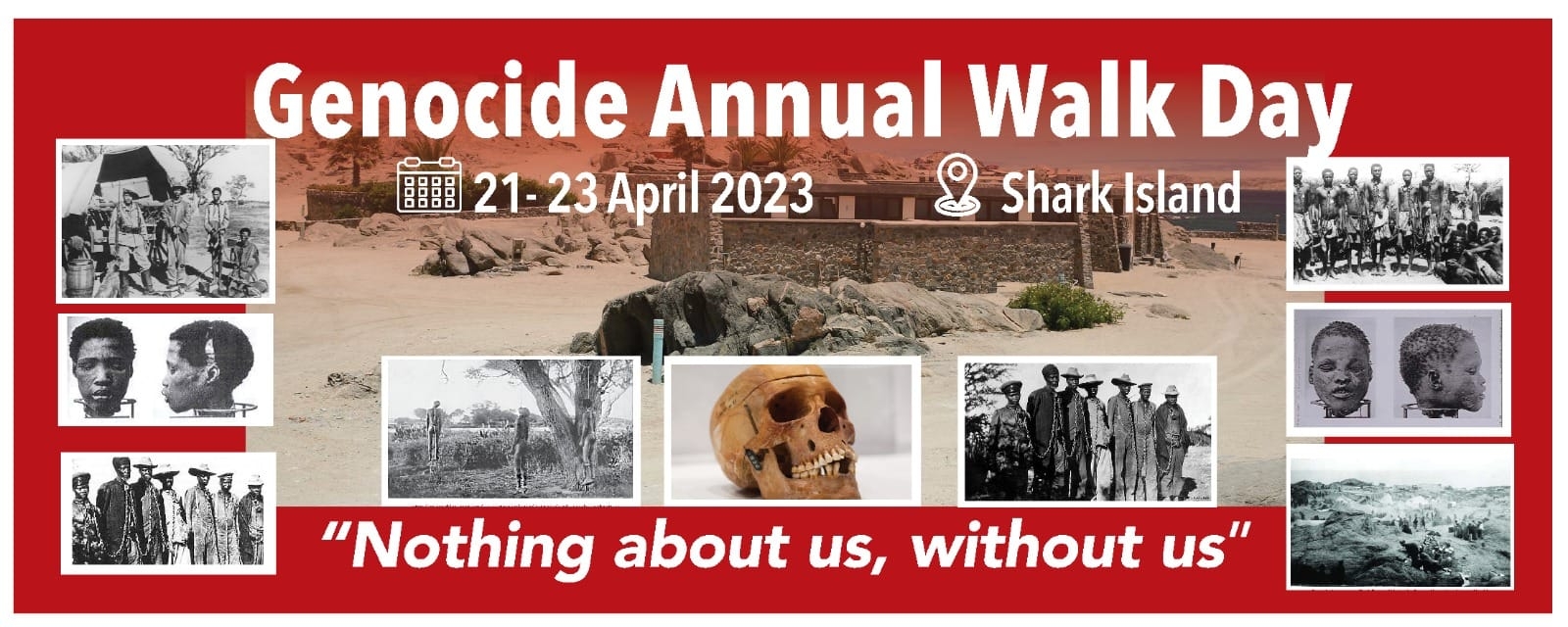Projekte




- Gedenkfeier für den Vernichtungsbefehl gegen die Witbooi Nama am 12. April 2023
Gedenkfeier zum Völkermord an den Nama und Ovaherero 21.-23. April 2023 in Lüderitz, Namibia:
- Projektfilm
- Bericht Tagesschau 22.04.2023
- Live-Stream:

Umbrella oft the Nama Traditional Authorities
Summary
Under this project, the Nama Traditional Leaders Association will create an economic planning organization with decision-making powers separate from the Council body to facilitate the execution of the Energy Park and other renewable energy projects.
Project Description
The foundation of NTLA was laid on 9th of January 1858 in Hoaxanas through the Hoaxanas Treaty. The NTLA ist he Umbrella for the govermental Nama Traditional authorities.
The funding for this project will enable the Nama Traditional Leaders Association to create a decision-making body separate from the Council that will actively pursue energy-related economic development for the Nama Traditional Authorities. This effort will be assisted by technical experts who can provide the knowledge to enable the Nama Traditional Athorities to make the best decisions after careful deliberation, ensuring the energy future of the Nama people.
The Nama Authorities has long believed that pursuing green technologies is a vital element of the overall stewardship plan to preserve the cultural and historical resources of their lands. The NTLA mission of serving the best interests of its Nama community and pursuing environmentally friendly technologies in the nation and state has proven to be socially beneficial, self-sustaining, and economically beneficial. The new separate decision making body will actively pursue energy-related economic development to ensure that opportunities afforded the Nama pople are thoroughly evaluated for the future benefit.
Project Objectives
Key objectives for this project include:
Designing and implement a Section or other economic planning organization to support renewable energy projects
Assigning a liaison between the NTLA and project partners, including utilities, funders, private contractors, and state and federal agencies
Conducting necessary training and professional development
Conducting community outreach regarding alternative energy and its benefits
Presenting training on existing and future opportunities in renewable energy
Informing the NTLA Council of the activities conducted under this program
Complying with administrative requirements of this grant.
By focusing on the economic development and planning of this funding, the NTLA can remain dedicated to its mission of serving its people while maintaining a stewardship role with its environment.
Project Location
The NTLA is located in southern Namibia.
The NTLA
The Association’s focus is on the provision of organisational and entrepreneurial development support through networking and establishing links.
Nama Traditional Leaders Association is working toward bringing together all of its community engagement activities under one overarching strategy aiming to ensure community engagement is planned meaningful and carried out in a timely manner.
We hope to get everyone and anyone involved and plays a part in ensuring that our people have participation in business-making in the regions where we live. By working together we can continue to improve our living standards and make our environment a better place to live.
In this document the secretariat in the office of the Nama Traditional Leaders Association provide information on progress made in response to the “Plight of the People of the South 2008” and the assignment given to the Nama traditional leaders by His Excellency the President: Mr Hifikepunye Pohamba, that of presenting some reflections on the absence of the southern people from the mainstream of the economy, as well as, on the instruction to do all that traditional leaders can do to bring the southern people into mainstream economy of the two sister regions.
The basic tenets for the propose programmes, following the talks with the President, are defined in two previous reports. The first report identified and pointed out the need for strategic engagement plan. This was a necessary first step taken in order to record ways for linking the work of the Association to that of sub-national structures of government and private sector as well as to grassroots initiatives in order to help streamline own organizational usefulness, on the one hand. And seek to obtain better handling of development support base information, on the other hand. This is because information regarding the systems of planning at subnational level and information regarding business development is not well organized, or adjusted for consumption by our communities. For this reason the Association decided to assume complementary role in bridging the asymmetry through representation, dissemination and encouraging constituent members for participation in the planning process of setting national goals so as to be able to take advantage of the opportunities offered in the locale of the set goals.
The second report considered the social characteristics and how it responds to broad post-independence socio-political and economic engineering. In it we attempted to identify the size, types and structure of our people’s businesses in order to consider the effects of Business Linkage Programmes as well as the Vendor Development Programmes. There is however, no reliable statistical data yet about the size, types, structure and the number of proponents of SMEs in the Hardap and Karas Regions. Let me hasten to say that there are lots of literary materials available but lack exact and specific information.
We’ve, among others, further identified differing opinions held by the captains of industries, procurement managers and others about their perceptions and concerns which warrant further investigations. The need therefore to enumerate collective and key informant views in order to ground-truth general and specifically held assertions about southern people’s non-performance turned out to be a necessary prerequisite. In this respect we’ve engaged, the University of Namibia and its Central Consultancy Bureau (UCCB), to assist with synthesis of the existing baseline information for purposes of condensing this into consistent action strategy. The study was however held in abeyance because of delays in funding.
Lazarus Kairabeb
Project Status
This project is the first draft
Nama Technical Committee on Genocide
Community Development Practitioner
Resource Mobilization
phone: +264 81 280 2541
mail:



